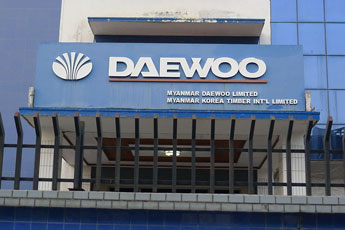Woodside Petroleum and Daewoo International Corp. have reached a deal to explore for oil and gas in Burma, giving the Australian firm a foot in the door in a promising oil and gas block.
 Woodside said in a statement on Friday that Daewoo had agreed to give it a 40 per cent stake in a production-sharing contract in Block AD-7 in the Rakhine Basin, in the western offshore area of Burma, next to Daewoo's Shwe field development.
Woodside said in a statement on Friday that Daewoo had agreed to give it a 40 per cent stake in a production-sharing contract in Block AD-7 in the Rakhine Basin, in the western offshore area of Burma, next to Daewoo's Shwe field development.
The deal gives Woodside an edge over other western energy companies eager to get into Burma energy sector.
Woodside is among several companies, including ConocoPhillips, Hess Corp, Royal Dutch Shell, BP and BG Group, lining up to get exploration and production agreements through a planned oil and gas exploration tender.
Woodside declined to comment on the tender, which the government recently postponed in order to ensure it met strict standards on transparency, environmental protection and social impacts expected by western companies.
Daewoo and Woodside plan to run seismic tests in 2013 and 2014 on the Rakhine block, with an option to drill an exploration well later, said a statement.
In September, Mizzima reported that n order to meet the transparency standards of the Western energy majors, Burma has delayed a tender offer until the end of the year.
The official said it was postponed after the government was approached by several Western oil firms, including ConocoPhillips, Hess Corp, Royal Dutch Shell, BP, BG Group and Australia's Woodside Petroleum.
“Some of the oil companies, like Shell, are very strict about international standards like transparency, environmental, social and biodiversity impacts,” the official said on the sidelines of an industry conference in Rangoon.
The government is expected to offer more than 10 offshore and around 10 onshore blocks to foreign investors.
The tender follows Burma’s largest oil and gas offering in August last year, which saw nine out of 18 onshore blocks snapped up by foreign firms.
On July 26, Mizzima reported that US companies may be holding back at this time because of the fluid nature of Burmese business laws and financial system, which have only undergone changes starting in 2011 after decades of control by the former military government, which lacked transparency and was rampantly corrupt.
A new foreign investment law is under debate in Parliament now, but there is still the issue of the Burmese judicial system, which opposition leader Aung San Suu Kyi has warned is not based on the rule of law according to international standards.
Also, there is the issue of the Myanma Oil and Gas Enterprise, a state-owned company that allocates all oil and gas rights and holds a majority stake in all onshore and offshore blocks, which means all energy firms investing in Burma become partners with the state-run company.


